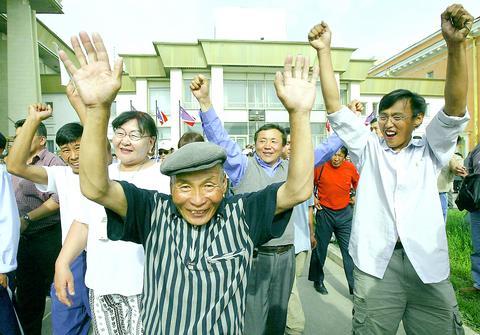Mongolia's opposition democrats claimed what would be a stunning victory yesterday in parliamentary elections disputed by Prime Min-ister Nambaryn Enkhbayar who accused his rivals of widespread vote-rigging.
The prime minister's Mongolian People's Revolutionary Party (MPRP) and Motherland Democratic Coalition (MDC) each won 36 seats in the Great Hural, or parliament, election committee officials said citing the first official preliminary result.

PHOTO: AFP
If officially confirmed by the election committee, the result would be a dramatic reversal for the MPRP, which had 72 seats in the 76-seat parliament before Sunday's polls and had been confident of an overwhelming victory.
The democratic coalition claimed victory by including three seats among their independent allies, which would mark a comeback for the democrats who were swept from power by the MPRP four years ago.
"The preliminary result is that the MPRP has 36 seats, the MDC has 36 seats, independents have three seats and the Mongolian Republican Party has one seat," said committee chairman Yadamsuren.
He said an official announcement was likely today after the commission verified results phoned in from 12 far-flung constituencies in a country where half the 2.7 million people are nomads and many voters travelled to polls by horseback or camel.
The MPRP, which ruled Mongolia for much of the 20th century as a one-party Soviet satellite, had been widely expected to skate to an easy victory after four years of economic stability in the impoverished country.
Now, Enkhbayar faces being ousted, though not without a fight.
"He [Enkhbayar] said there was a certain amount of irregularities in certain constituencies," said Tjalling Halbertsma, an adviser to the party chairman, citing the movement of people to vote outside their constituencies.

MAKING WAVES: China’s maritime militia could become a nontraditional threat in war, clogging up shipping lanes to prevent US or Japanese intervention, a report said About 1,900 Chinese ships flying flags of convenience and fishing vessels that participated in China’s military exercises around Taiwan last month and in January have been listed for monitoring, Coast Guard Administration (CGA) Deputy Director-General Hsieh Ching-chin (謝慶欽) said yesterday. Following amendments to the Commercial Port Act (商港法) and the Law of Ships (船舶法) last month, the CGA can designate possible berthing areas or deny ports of call for vessels suspected of loitering around areas where undersea cables can be accessed, Oceans Affairs Council Minister Kuan Bi-ling (管碧玲) said. The list of suspected ships, originally 300, had risen to about 1,900 as

Right-wing political scientist Laura Fernandez on Sunday won Costa Rica’s presidential election by a landslide, after promising to crack down on rising violence linked to the cocaine trade. Fernandez’s nearest rival, economist Alvaro Ramos, conceded defeat as results showed the ruling party far exceeding the threshold of 40 percent needed to avoid a runoff. With 94 percent of polling stations counted, the political heir of outgoing Costa Rican President Rodrigo Chaves had captured 48.3 percent of the vote compared with Ramos’ 33.4 percent, the Supreme Electoral Tribunal said. As soon as the first results were announced, members of Fernandez’s Sovereign People’s Party

MORE RESPONSIBILITY: Draftees would be expected to fight alongside professional soldiers, likely requiring the transformation of some training brigades into combat units The armed forces are to start incorporating new conscripts into combined arms brigades this year to enhance combat readiness, the Executive Yuan’s latest policy report said. The new policy would affect Taiwanese men entering the military for their compulsory service, which was extended to one year under reforms by then-president Tsai Ing-wen (蔡英文) in 2022. The conscripts would be trained to operate machine guns, uncrewed aerial vehicles, anti-tank guided missile launchers and Stinger air defense systems, the report said, adding that the basic training would be lengthened to eight weeks. After basic training, conscripts would be sorted into infantry battalions that would take

GROWING AMBITIONS: The scale and tempo of the operations show that the Strait has become the core theater for China to expand its security interests, the report said Chinese military aircraft incursions around Taiwan have surged nearly 15-fold over the past five years, according to a report released yesterday by the Democratic Progressive Party’s (DPP) Department of China Affairs. Sorties in the Taiwan Strait were previously irregular, totaling 380 in 2020, but have since evolved into routine operations, the report showed. “This demonstrates that the Taiwan Strait has become both the starting point and testing ground for Beijing’s expansionist ambitions,” it said. Driven by military expansionism, China is systematically pursuing actions aimed at altering the regional “status quo,” the department said, adding that Taiwan represents the most critical link in China’s